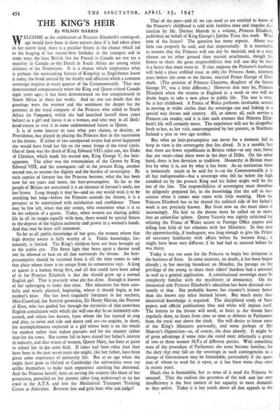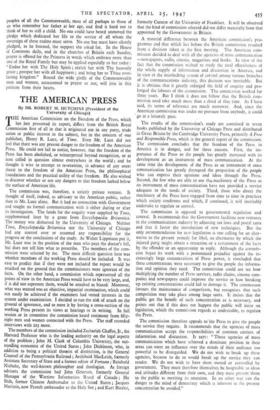THE KING'S HEIR
By WILSON HARRIS
WELCOME as the celebration of Princess Elizabeth's coming-of- age would have been in these austere days if it had taken place in her native land, there is a peculiar fitness in the chance which led
to the keeping of her twenty-first birthday in the youngest and in some ways the least British (for the French in Canada are not yet a majority in Canada asothe Dutch in South Africa are among white citizens) of the Domini(ins. It is a chance which emphasises what is perhaps the outstanding feature of Kingship as Englishmen know it today, the bond created by the loyalty and affection which a common sovereign inspires in every quarter of the Commonwealth. That was demonstrated conspicuously when the King and Queen visited Canada eight years ago ; it has been demonstrated no less conspicuously in South Africa in these last weeks. And no one can doubt that the greetings were the warmer and the sentiment the deeper for the presence in the royal company of the Princess who sailed to South Africa (in Vanguard, which she had launched herself three years before) as a girl and leaves it as a woman, and who may in all likeli- hood return to visit it in some undetermined future as Queen.
It is of some interest to note what part chance, or destiny, or Providence, has played in placing the Princess first in the succession to the throne. If either of two unexpected events had never happened she would have lived her life on the outer fringe of the royal circle. One of them was the death of King Edward VII's elder son, the Duke of Clarence, which made his second son, King George V, the heir- apparent. The other was the renunciation of the Crown by King Edward VIII, and the consequent call to the present King, another second son, to assume the dignity and the burden of sovereignty. By such caprice of fortune has the Princess become, what she has been now for ten years and more,. the heir-presumptive. So far as the people of Britain are concerned it is an instance of fortune's smile, not her frown. Long though it may be—and no one would wish it to be anything but long—before the Princess ascends the throne, it is a prospect to be entertained with satisfaction and confidence. There may be few left, when that day comes, who remember what it is to be the subjects of a queen. Today, when women are sharing public life in all its ranges equally with men, there would be special fitness in the deposit of the highest authority and power in a woman's hands. And that may be truer still tomorrow.
So far as all public knowledge of her goes, the woman whom that high destiny awaits is fully worthy of it. Public knowledge, for- tunately, is limited. The King's children have not been brought up in the public eye. The fierce light that beats upon a throne need not be allowed to beat on all that surrounds the throne. An heir- presumptive should be screened from it till the time comes to take that place where there is no escape from its remorseless rays. A king or queen is a human being first, and all that could have been asked of or for Princess Elizabeth is that she should grow up a normal
English girl. That is precisely what she ,has done. Enough is known of her upbringing to make that clear. Her education has been care-
fully and wisely planned, beginning, where it should begin, at her mother's knee. She has been singularly fortunate in her teachers, Miss Crawford, her Scottish governess, Sir Henry Martan, the Provost of Eton, who has guided her through, the mysteries of that unwritten English constitution with which she will one day be so intimately con- cerned, and others less known, from whom she has learned to sing and play, to swim and ride and dance and act—to acquire, in short, the accomplishments expected in a girl whose bent is on the whole for outdoor rather than indoor pursuits and for the country rather than for the town. She cannot fail to have shared her father's interest in industry, and that wisest of women, Queen Mary, has been at pains to school her in the same field. If times had been other than they have been in the past seven years she might, like her father, have been given some experience of university life. But at an age when she might have gone to Oxford or Cambridge the universities were too unlike themselves to make such experience anything but abnormal. And the Princess herself, bent on serving the country like those of her generation, prevailed on her parents (after long endeavour) to let her enrol in the A.T.S. and join the Mechanical Transport Training Centre at Aldershot. Between loss and gain here who can judge?
That of the past—and all we can need or are entitled to know of the Princess's childhood is told with faultless taste and singular dis- tinction by Mr. Dermot Morrab in a volume, Princess Elizabeth, published on behalf of King George's Jubilee Trust this week. What now of the future? The question has many aspects. About one little can properly be said, and that impersonally. It is reasonable to assume that the Princess will one day be married, and to a man chosen on 'no other ground than mutual attachment, though his fitness to share the great responsibilities that will one day be hers is a factor that must enter in. If that nappens the Princess's husband will hold a place unfilled since in 5683 the Princess Anne, nineteen years before she came to the throne, married Prince George of Den- mark. (The position of Princess Charlotte, daughter of the future George IV, was a little different.) However that may be, Princess Elizabeth when she returns to England in a week or two will no doubt begin to take a new place in public life. The war is over. So is her childhood. A Prince of Wales performs invaluable service in moving in wider circles than the sovereign can and linking in a special way throne and country. All, or almost all, such service a Princess can render, and it is into such avenues that Princess Eliza- beth's life will certainly move. The experience will not be altogether fresh to her, as her visit, unaccompanied by her parents, to Northern Ireland a year or two ago testifies.
But what an heir-presumptive can never for a moment fail to keep in view is the sovereignty that lies ahead. It is a notable fact that there are fewer republicans in Britain today—at any rate, fewer that are vocal—than there were in the days of Dilke. On the other hand, there is less devotion to tradition. Monarchy in Britain must live by what it is, not by what it has been. As an institution there is immensely much to be said for it—to the Commonwealth it is all but indispensable—but a sovereign who fell far below the high standard set by the present King and his father might well be the last of the line. The responsibilities of sovereignty must therefore be diligently prepared for, in the knowledge that the call to suc- cession when it comes may come with little warning. How far Princess Elizabeth has so far shared the political side of her father's work is not precisely known. But from now on she must share it increasingly. No heir to the throne must be called on to move into an unfamiliar sphere. Queen Victoria was rightly criticised for refusing the Prince of Wales access to Foreign Office papers and telling him little of her relations with her Ministers. In that case the apprenticeship, if -inadequate, was long enough to give the Prince all necessary familiarity with affairs before he became king ; it might have been very different if he had had to succeed before he was thirty.
Today is not too soon for the Princess to begin her initiation in the business of State. In some measure, no doubt, it has been begun already ; in her moving broadcast on Monday, the passage on the privilege of the young to share their elders' burdens had a personal as well as a general application. A constitutional sovereign must be completely familiar with the machinery of democracy. On the theoretical side Princess Elizabeth's education has been directed con- stantly to that. She probably knows her country's history better than she knows any other learned lesson. But much more than theoretical knowledge is required. The disciplined study of State papers and official publications blue and white will impose itself. The heiress to the throne will need, as heirs to the throne have regularly done, to listen from time to time to debates in Parliament from the royal seat above the clock. She will desire to know some of the King's Ministers personally, and some perhaps of His Majesty's Opposition—as, of course, she does already. It might be of great advantage if some time she could meet informally a group of two or three women M.P.s of different parties. With something even of the procedure of Parliament she must become familiar, -for the duty that may fall on the sovereign in such contingencies as a change of Government may be formidable, particularly if the ques- tion of whom to send for is open, as it has been 'more than once in recent years.
Much else is formidable, but to none of it need the Princess be unequal. That she realises the greatness of the task and her own insufficiency is the best earnest of her capacity to meet demands as they arrive. Today it is her youth above all that appeals to the
peoples of all the Commonwealth, most of all perhaps to those of us who remember her father at her age, and find it hard not to think of her as still a child. No one could have heard tuttneved the pledge which dedicated her life to the service of all whom the sovereign of these realms must serve. No one but must have silently pledged, as he listened, the support she asked for. In the House -of Commons daily, and in the churches of Britain each Sunday, prayer is offered for the Princess in words which embrace more than one of the Royal Family but may be applied especially to her today : "Endue her with Thy Holy Spirit ; enrich her with Thy heavenly grace ; prosper her with all happiness ; and bring her to Thine ever- lasting kingdom." Round the wide girdle of the Commonwealth men and women, accustomed to prayer or not, will join in this petition from their hearts.



































 Previous page
Previous page